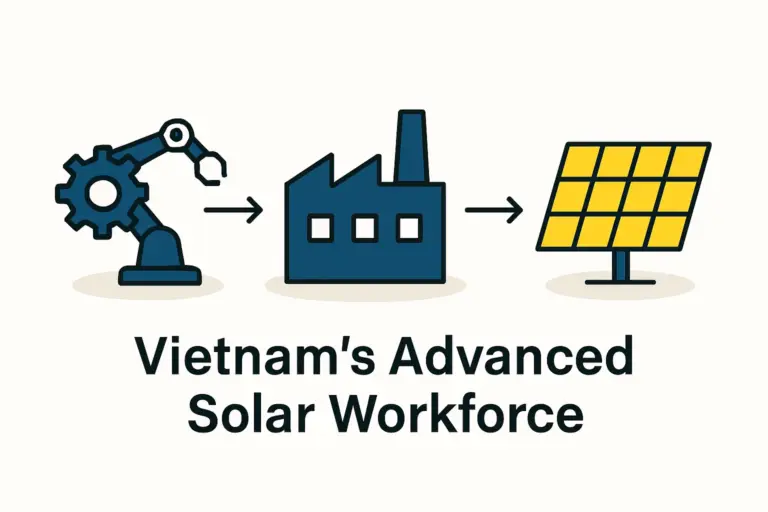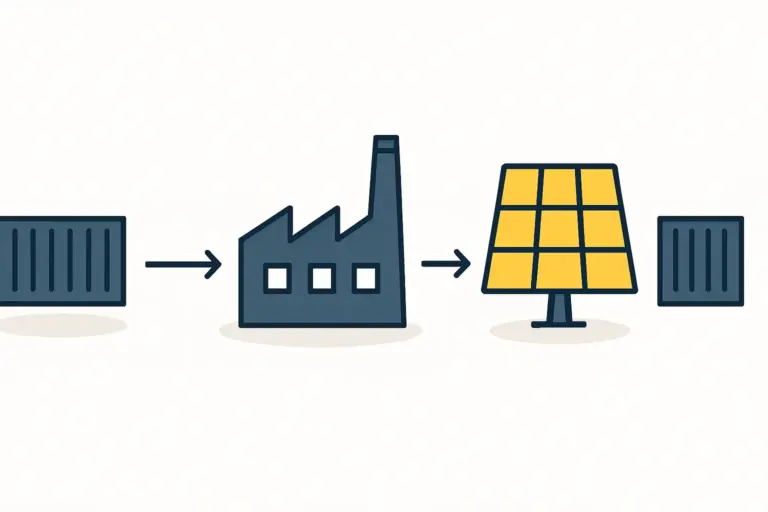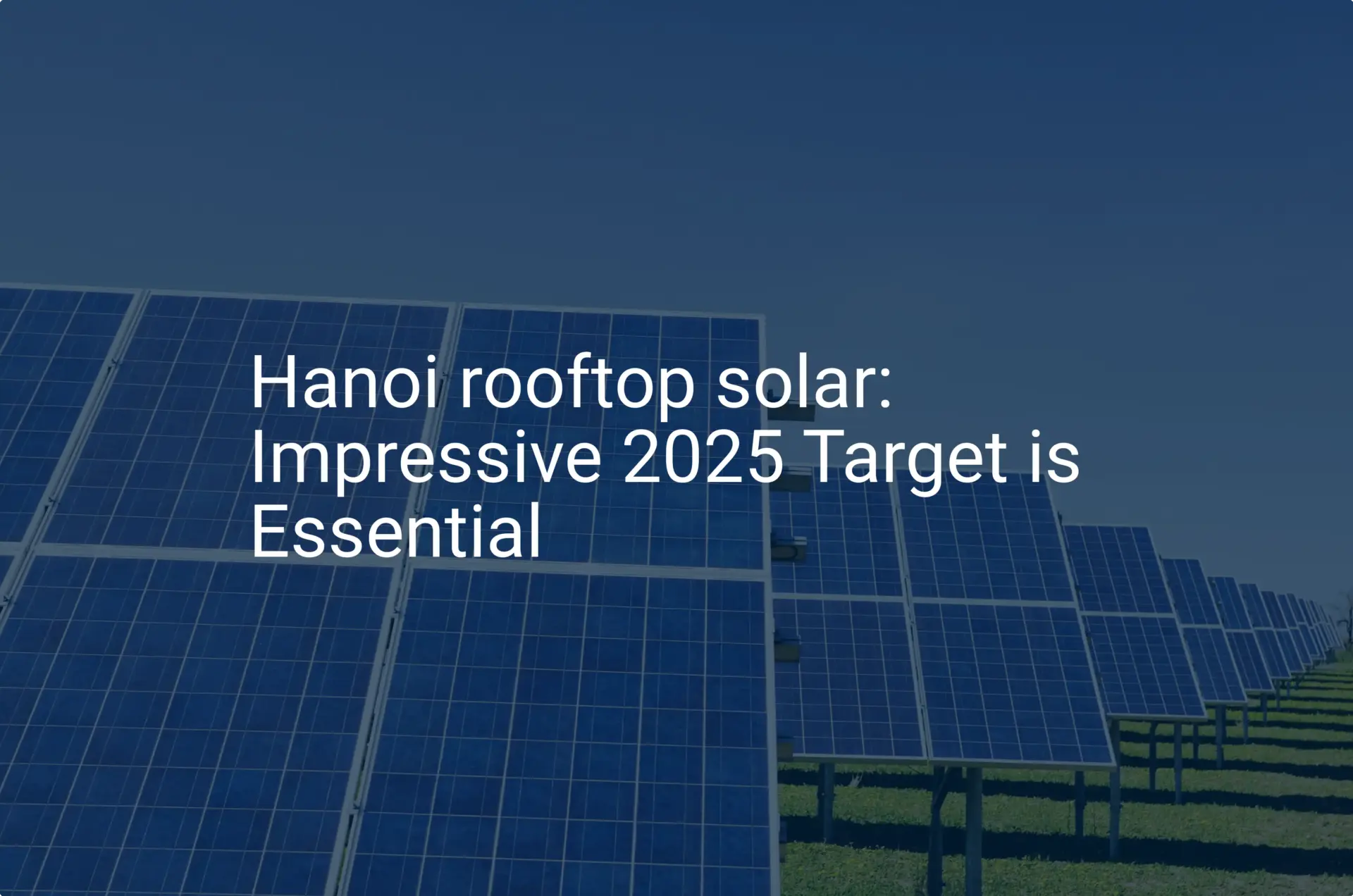Disclaimer: This case study represents a composite example derived from real-world
consulting work by J.v.G. Technology GmbH in solar module production and factory optimization. All data points are realistic but simplified for clarity and educational purposes.
Many entrepreneurs considering the solar manufacturing sector assume their greatest challenge will be sourcing advanced machinery. But experience from numerous turnkey projects reveals that the most critical asset isn’t the equipment, but the people who operate it. For investors looking at Vietnam, a common question arises: ‘How can I build a team of skilled technicians in a country where solar manufacturing is not yet a widespread industry?’
The answer lies not in finding pre-existing solar experts, but in recognizing the vast, adjacent talent pool that already exists. The rise of Vietnam as a global hub for electronics assembly, driven by giants like Samsung and LG, has cultivated a workforce with the precise skills needed for high-quality photovoltaic module production. This guide outlines a strategic approach to recruitment and training for transforming electronics assemblers into proficient solar technicians.
Vietnam’s Human Capital: A Strategic Advantage
An investment in Vietnam is an investment in its people. The nation’s ‘demographic dividend’—a youthful, motivated, and increasingly educated population of nearly 100 million—provides a strong foundation for industrial growth.
This potential is actively supported by government policy. The Political Bureau’s Resolution No. 50-NQ/TW, for instance, aims to attract foreign investment in high-tech industries and ensure a favorable environment for ventures like solar manufacturing.
This support has spurred the development of world-class industrial parks, particularly in regions like Bắc Ninh and Thái Nguyên, now epicenters for electronics production. The result is a large labor force trained in environments that demand precision, discipline, and adherence to strict quality standards—all prerequisites for success in solar module assembly.

The key insight for the new solar entrepreneur is this: the fundamental skills are already there. The challenge isn’t to create a skilled workforce from scratch, but to channel existing capabilities toward a new application.
Bridging the Gap: From Electronics Assembly to Solar Photovoltaics
At first glance, making a smartphone and a solar module may seem entirely different. But the core operational competencies are remarkably similar. An employee proficient in electronics assembly already has the most difficult-to-teach attributes.
Key Transferable Skills:
-
Manual Dexterity and Precision: Assembling intricate electronic components demands exceptional fine motor control. This skill translates directly to the delicate handling of solar cells during the stringing and bussing stages of the solar module manufacturing process.
-
Cleanroom Discipline: Electronics workers are accustomed to controlled environments where minimizing contamination is paramount. This discipline is essential in solar manufacturing, where dust and particles can create defects and reduce module efficiency.
-
Process Adherence: Following standardized operating procedures (SOPs) without deviation is fundamental in both industries for ensuring consistent product quality. This mindset is crucial for achieving high yields and certifications in a solar factory.
-
Aptitude for Technical Learning: The workforce in Vietnam’s industrial parks has proven its ability to quickly learn and adapt to new technologies and machinery—a vital asset when introducing specialized photovoltaic equipment.
This overlap means the recruitment pool is not limited to a handful of solar veterans but extends to thousands of qualified individuals in the electronics sector. The focus shifts from finding experience to implementing an effective training program.
A Structured Approach to Recruitment and Training
Building a high-performing team requires a methodical process, starting with identifying the right candidates and equipping them with specialized knowledge. For a typical 20–50 MW production line, a starting workforce of 25–30 employees is a realistic target.
Step 1: Sourcing and Selecting Talent
Instead of posting generic ads for ‘solar technicians,’ recruitment efforts should target candidates with backgrounds in electronics, quality control, or machine operation.
Primary Sourcing Channels:
-
Vocational Education and Training (VET) Institutions: Vietnam has a robust network of VET colleges that supply industries with technically-minded graduates.
-
Industrial Park Job Boards: Direct access to workers already employed in relevant manufacturing environments.
-
Local Recruitment Agencies: Specialists who understand the labor landscape in key industrial provinces.
During the interview process, focus on assessing attitude and aptitude. A candidate who demonstrates attention to detail, a methodical approach to problem-solving, and a genuine interest in technology is often more valuable than one with superficial prior experience.
Step 2: The Foundational Training Program
Once the core team is assembled, a structured training program transforms their general manufacturing skills into specialized solar expertise. Experience gained from European PV manufacturers’ turnkey projects shows this process is most effective when divided into three phases.
Phase 1: Classroom-Based Theoretical Knowledge
Before touching any equipment, the team must understand the ‘why’ behind their work. This phase, often lasting one to two weeks, covers:
- Fundamentals of photovoltaic technology (how a solar cell generates electricity).
- The anatomy of a solar module and the function of each component.
- Critical quality control points in the production line.
- Workplace safety protocols, especially regarding electrical and mechanical hazards.
This theoretical foundation is essential for empowering employees to make informed decisions during production. Educational resources, such as the structured e-courses provided by pvknowhow.com, can significantly accelerate this learning phase.
Phase 2: Hands-On Machine and Process Training
This is the most critical phase, where theory is put into practice. The training is conducted directly on the production floor, machine by machine, under the guidance of experienced engineers.
- Machine-Specific Modules: Each team member receives intensive training on specific equipment, such as the automatic stringer, laminator, and solar simulator.
- Supervised Operation: Trainees operate the machinery under close supervision, learning to manage settings, perform routine maintenance, and troubleshoot common issues.
- Mastering the Workflow: The focus expands from individual tasks to understanding how each step connects, ensuring a smooth and efficient flow from raw materials to the final product.
This hands-on approach, often led by the equipment supplier’s engineers as part of a turnkey solar factory setup, ensures that the local team develops not just proficiency but true ownership of the production process.

Step 3: Cultivating a Culture of Quality
Once the team can operate the machinery proficiently, the final step is to instill a deep-seated culture of quality control and continuous improvement.
- Defect Recognition: Training employees to identify potential defects—such as microcracks, soldering imperfections, or lamination bubbles—is paramount for maintaining high product standards.
- Root Cause Analysis: Empowering operators and technicians to not only spot problems but also help identify their root causes creates a proactive, rather than reactive, environment.
- Career Progression: Establishing clear career paths from operator to technician to line supervisor motivates employees and helps retain top talent, building a sustainable and knowledgeable local leadership team.

Frequently Asked Questions (FAQ)
-
Do my technicians need prior experience in the solar industry?
No. In fact, for operational roles, it’s often better to hire candidates with strong backgrounds in electronics assembly and provide them with specialized solar training. Their existing skills in precision, process discipline, and cleanroom work are highly transferable and provide a stronger foundation than superficial solar experience. -
How long does it take to train a new team for a solar module factory?
A well-structured program can bring a new team to operational proficiency within four to six weeks. This typically includes one week of theoretical training followed by three to five weeks of intensive, hands-on training on the production line with experienced engineers. -
What is the typical team size needed to start a 50 MW solar factory?
A semi-automated 50 MW line can typically be operated with a team of approximately 25 to 30 people per shift. This includes line operators, quality control inspectors, maintenance technicians, and shift supervisors. -
Can a factory manager be hired locally in Vietnam?
Yes, this is entirely feasible. The ideal candidate would have management experience in a high-tech manufacturing environment, such as electronics or semiconductors. They should possess strong leadership skills, an understanding of quality management systems (like ISO 9001), and the ability to manage a technically skilled workforce.
Conclusion: Your Workforce Is Your Greatest Asset
For entrepreneurs entering the solar industry in Vietnam, the path to building a skilled workforce is clear and achievable. The country’s dynamic, disciplined, and technically adept labor pool—cultivated by the electronics sector—represents a powerful strategic advantage.
By focusing recruitment on transferable skills and implementing a rigorous, multi-phased training program, a new venture can build a team capable of producing world-class solar modules. With the right guidance and a structured approach, your investment in people will yield the highest returns, ensuring the long-term success and quality reputation of your manufacturing operation.
Download the Vietnam Solar Workforce Development Case Study (PDF)
Author: This case study was prepared by the
turnkey solar module production specialists at J.V.G. Technology GmbH
It is based on real data and consulting experience from J.v.G. projects
worldwide, including installations ranging from 20 MW to 500 MW capacity.






